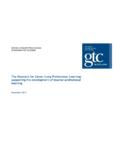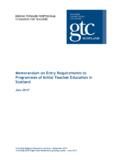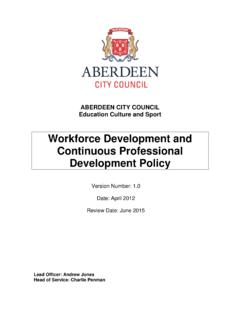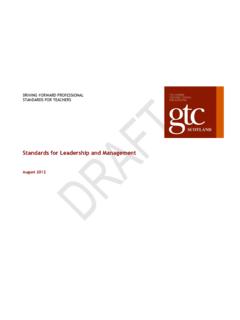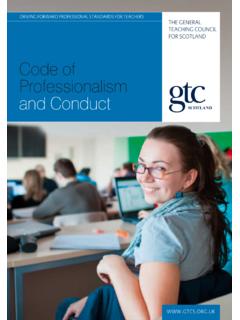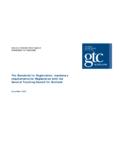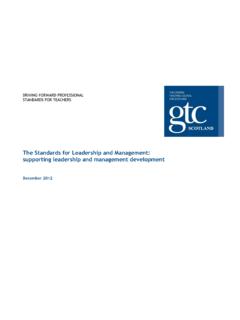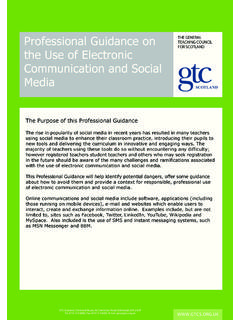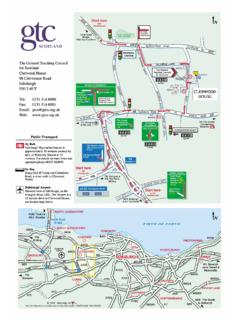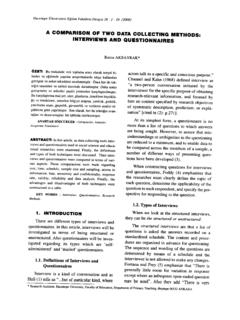Transcription of General Teaching Council for Scotland Response to …
1 General Teaching Council for Scotland Response to scottish government consultation empowering Schools: a consultation on the provisions of the Education ( Scotland ) Bill Executive Summary The Council of the General Teaching Council for Scotland (GTCS) is fully supportive of the scottish government 's aspiration to improve the education and life chances of all children and young people. The Council agrees wholeheartedly that the success of children and young people depends on high quality learning and Teaching and leadership, and that these are linked directly to GTCS' role in ensuring high standards are set for those entering the Teaching profession, maintaining high quality Professional Standards and promoting professional learning and leadership. Council is also firmly of the view that those best placed to drive improvement are teachers, practitioners and other professionals who are directly engaged in the learning and Teaching process. In recognition of this, the Council 's Response to the original scottish government consultation on empowering teachers, parents and communities to achieve Excellence and Equity in Education suggested an extension to the existing role and functions of GTCS to take on board a wider range of education professionals.
2 This was seen as a positive and exciting opportunity for improving the coherence of registration, regulation and professional development of those most directly involved in learning and Teaching . Such a change, it was felt, would bring greater cohesion and consistency in areas such as Professional Standards and professional learning, and would allow pupils, parents and the public to see a clear pathway of regulation of education professionals. This change would also provide reassurance that standards were being upheld and public protection was being assured by a body independent of government and others. It is important to stress that GTCS' Council did not call for, or envisage, a completely new body being created with the consequent disappearance of GTCS or any other registration or regulatory body. GTCS' Council saw the Welsh EWC as an example of extending the scope of an already well-established registration and regulation body (GTCS) which also plays a key role in supporting professional learning and leadership development; it did not see it as a model for replication.
3 It is worth noting that there have been considerable issues establishing an EWC in Wales not least because the recognised branding and reputation of the General Teaching Council for Wales (GTCW) was removed and replaced with different, and at times confusing, nomenclature Since being granted independence by the scottish government in 2011, GTCS has shown its willingness and success in embracing and leading change for the benefit of the scottish education system, its Teaching professionals, its users and the scottish public. Its Professional Standards are recognised and used as models for other Standards Councils around the world; it has evolved its registration processes and categories to meet changing demands; it has delivered on its enhanced role in supporting leadership and professional learning; and it has introduced new regulatory arrangements that align with best practice. GTCS is, therefore, a body that has shown itself able to evolve and develop creatively to address new and demanding challenges, and this has been recognised by a number of internationally respected experts not least the OECD.
4 The existing GTCS is well placed to take on board and support the challenges set out in empowering Schools, without the need to create a new Education Workforce Council Scotland (EWCS). body. There is a clear and absolute need for an independent registration and regulatory body like GTCS in scottish education which operates as the guardian of a set of world leading professional standards. These standards provide an example of professional expectations at their best and provide the way ahead for other education professionals. The development of a suite of professional standards across educational professionals has the potential to bring both a cohesion and streamlining across education in Scotland and provide opportunities for meaningful professional dialogue and professional learning, using shared language and values, with a shared focus on positive outcomes for children and families. The way to achieve this is not through the proposals to establish a new body called the Education Workforce Council for Scotland as set out in the empowering Schools consultation document but by building on the considerable strengths of the existing GTCS and extending its functions, working in collaboration with the Community Learning Development and Standards Council (CLDSC) and other stakeholders.
5 Below we answer in full the other questions posed in the consultation ; but first we outline our key messages on the proposed establishment of an EWCS. 2018-01-30-GTCS- Response -to- consultation Page 1 of 39. 2. Key Messages The Council of GTCS is strongly opposed to the establishment of an EWCS as set out by the scottish government in the empowering Schools document. In particular, there is no evidence-based rationale for replacing GTCS, with its strong brand and highly-regarded national and international reputation, with a new body. It is our view that the proposal to establish an EWCS focuses too much on unnecessary and costly structural change which will only serve to distract and detract GTCS from continuing to make the progress it has made in recent years, rather than focusing on more meaningful, impactful changes. Council 's view is that the expensive set-up and recurring costs in establishing an EWCS (set out in Appendix 2) would be much better used to support front-line services that deliver learning and Teaching .
6 GTCS is concerned that in proposing the establishment of an EWCS, scottish government 's own internal policy making principles of being outcome focused and engaging stakeholders are not being applied. It is felt by GTCS Council that the inclusion of some professionals who are only indirectly involved in learning and Teaching , such as school librarians and home- school link workers, will not bring any direct benefits to teachers, children and young people and risks eroding the professional identity and status of teachers. The inclusion of other professionals, who are not directly influencing the learning and Teaching environment, is at odds with the scottish government 's stated objective of moving to a school and teacher-led system. In addition, the inclusion of such a wide range of other professionals being proposed detracts from one of the key drivers within the National Improvement Framework which is to support and enhance teacher professionalism and school leadership. The lack of clarity, and the existence of some confusion surrounding which other groups of education professionals are to be subject to registration is unhelpful.
7 GTCS questions the extent to which some of the proposed groups of professionals directly influence learning and Teaching and the proportionality of introducing mandatory registration for them. At the same time, professionals such as instrumental music instructors, sports coaches and active school coordinators, many of whom support directly the delivery of the curriculum and have a direct input to learning and Teaching , have been missed from the list. GTCS' Council feels that the level and complexity of change being proposed in establishing a new body is unnecessary and will impact adversely on the ability of the current organisation, and potentially also those other bodies within scope of the proposal, to continue to deliver the high quality expected in its existing and developing operations. Leading on from the previous point, GTCS has significant concerns about the costs involved in setting up a new body of the type being proposed, the major legal and operational implications and the risks related to these.
8 These are shown in Appendix 1 to this return in which GTCS has carefully analysed four options (A-D) for extending registration and regulation to a wider range of education professionals and changing GTCS's legal status. A notable concern that we have highlighted in this respect is that the impact arising from the proposal on GTCS's current charitable status is unclear and any change in this respect would have severe, as yet uncosted, financial implications. An associated financial paper (attached as Appendix 2), based on known costs, sets out the financial implications of implementing option A which reflects the proposal set out by the scottish government to create a new EWCS. These proposals come at a time when GTCS has already moved in the last few years in a constructive, well-considered and manageable way towards registering and regulating and enhancing the professional learning of a wider range of education professionals. We have worked hard with stakeholders to offer increased flexibility for potential registrants; we have helped to increase the number of pathways into the Teaching profession; and we are well ahead in the process to register college lecturers thus widening our registration base.
9 It should be noted that GTCS also currently registers a small number of early years teachers and offers registration to college lecturers on a voluntary basis. The proposed loss of GTCS as an independent body has the potential to do irreparable harm to the status and identity of teachers at a time when teachers' professionalism, grounded in professional standards, is increasingly recognised as being critical to delivering the scottish government 's aspirations of bringing about improvement in outcomes for all and closing the attainment gap. 2018-01-30-GTCS- Response -to- consultation Page 2 of 39. 3. The potential loss of GTCS as the professional body for teachers will impact adversely on the global reputation of the scottish education system given that its work is often reported on positively by prominent national and international educators and in the 2015 OECD report, Improving Schools in Scotland : An OECD Perspective (2015). The Council of GTCS is of the view that the most manageable way forward would be to make simple amendments to GTCS's existing legislation, thereby extending its current role and functions which already provide for the registration of other education professionals.
10 This would allow GTCS to both register and regulate initially college lecturers, instrumental music instructors and early years practitioners. scottish government should also ask GTCS to work with a range of partners to consider the extent to which other appropriate professional groups might be registered and regulated in a phased manner and the timescale over which this might happen. In addition, and as any further groups of education professionals are made subject to registration and regulation, GTCS should be asked to review its governance arrangements to ensure they remain fit for purpose and aligned with best practice. GTCS believes strongly that this way forward could be achieved at a fraction of the cost of the full proposals set out in empowering Schools, in a more efficient and pragmatic way, managing significantly the range of implications that we have identified and enabling a more realistic timeframe. It is important to stress again that the Council of GTCS is fully supportive of the scottish government 's aspiration to improve the education and life chances of all children and young people.
